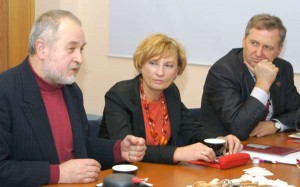- November 21, 2012
- 463
The entrepreneurs from “Korona” in the Vilnius branch of the University of Białystok

The members of Forum Przedsiębiorczości Polskiej „Korona” (The Polish Business Forum „The Crown”) discussed future cooperation with the representatives of the university during the meeting on Monday, 19th of November.
The university was represented by Prof. Jarosław Wołkonowski, the dean of the Economics and Information Technology Department, and Dr. Alina Grynia, the deputy dean.
At the beginning the group of scientists presented the legal basis connected with the functioning of the branch of the University of Białystok, as well as showed the statistics on the level of Polish minority’s education in comparison with the whole population of Lithuania.
According to the representatives of the university and the entrepreneurs, the Vilnius branch plays a significant role in this field.
Although the university has all the necessary permits and issues diplomas which are respected by the government, the first years of its activity were not easy. This fact was stressed by Zygmunt Klonowski, the chairman of “Korona”, who also reminded about the university’s problems which were successfully solved only at the highest political level.
However, it is worth noting that according to the statistics from 2001, the number of Polish people with higher education living in Lithuania (63 persons per 1000 people) is two times lower than the average number of people with higher education in Lithuania (126 persons per 1000 people). This phenomenon probably has not changed significantly.
The entrepreneurs and the representatives of the university discussed the major causes of this phenomenon.
Prof. Wołkonowski said that despite the difficulties that appeared at the beginnings of the university’s functioning, the graduates will be successful in finding the job. Sometimes they start their own business activity in various trades or do postgraduates studies in Poland.
The deputy dean Dr. Alina Grynia stressed the fact that in the ranking of all universities in the world, the branch of the University in Białystok was classified as the fourth best university in Lithuania. She stated that in the process of preparing the ranking, what is taken into consideration is also the cooperation with economic and business units. Everyone agreed that this is a good sign and can lead to closer cooperation in the future.
They suggested various solutions which would get students interested in business. The deputy dean said that theoretical knowledge will never replace practice.
The entrepreneurs from “Korona” promised to hire students as their apprentices and help them in their development.
The idea that appealed to everyone was to organize open lectures at the university which would be given by entrepreneurs. Dr Grynia summed up by saying that the cooperation is good when it brings mutual benefits.
Other important ideas concerned giving students the task to do market research as a preparation for writing their theses, or establishing business incubators in the future.
At the end, it was announced that there will be a special document in the future signed by the representatives of the university and business environment. It will set the direction of cooperation.
The meeting was the answer to new trends that are evolving in economy and higher education. The link between these two fields demands the cooperation of their representatives.
The current tendencies show that the direction of higher education’s development should correspond to the needs of labour market. The effects of the declared cooperation – as it was mentioned during the meeting – will bring mutual benefits.
Marcin Skalski
Source: http://kurierwilenski.lt/2012/11/21/przedsiebiorcy-z-korony-w-wilenskiej-filii-uwb/
Tłumaczenie Katarzyna Kurowska w ramach praktyk w Europejskiej Fundacji Praw Człowieka, www.efhr.eu. Translated by Katarzyna Kurowska the framework of a traineeship programme of the European Foundation of Human Rights, www.efhr.eu.

